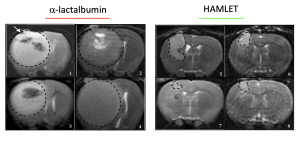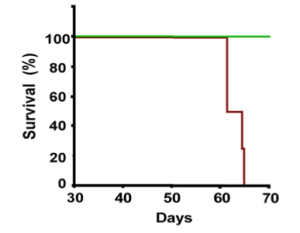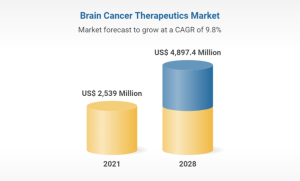The brain and spinal cord form the central nervous system, where vital functions are controlled. Brain tumors that disturb those functions may be very destructive and the treatment of brain tumors is challenging, due to the lack of drugs that are efficient and suitable for delivery into the central nervous system. Unlike other organs, the brain does not easily tolerate invasive procedures, making surgical removal of tumors particularly difficult. In many cases, the location of tumors within the brain may render them inoperable without causing severe damage to vital neural structures.
- Glioblastoma is a fast-growing and often highly invasive brain cancer with a poor prognosis, accounting for more than half of all brain tumor cases in adults, with a median survival time measured in months.
- Tumors in the central nervous system can often be metastases from cancers in peripheral organs. In view of the broad anti-tumor effects of Alpha1H and the low toxicity, targeting metastatic tumors in the brain might be extremely useful.
Therapeutic potential of Alpha1H against brain tumors
HAMLET has shown great promise for the treatment of brain tumors, killing brain tumor cells of different origins. In an experimental brain tumor model HAMLET was shown to have potent therapeutic effects in vivo, reducing tumor cell growth, inducing apoptosis in tumor cells and extending survival. Laboratory studies have shown that Alpha1H, like HAMLET, effectively kills brain tumor cells.
Reduced tumor progression and prolonged survival
Technology for convection enhanced delivery of drugs to the brain
Convection Enhanced Delivery (CED) represents a significant advancement in administering medications directly to brain tissue, bypassing the blood-brain barrier—a selective barrier that typically prevents bloodstream-carried drugs from entering the brain. This precision-targeted approach deposits drugs close to brain tumors, facilitating direct tumor access, and may also aid in removing cellular debris by irrigating and evacuating the site of treatment. The properties of Alpha1H, and its effectiveness in bladder cancer treatment, makes it particularly well-suited for CED.
Professor Steven Gill is at the forefront of developing this direct CNS therapy delivery technology. His use of CED positions him as a leading figure in the domain. The objective of this technological innovation is to achieve safe, rapid intraparenchymal and intrathecal drug delivery— currently unrivalled by any other provider.
Collaboration – Hamlet BioPharma and Neurochase Limited
Following the collaboration between Professor Gill and Professor Svanborg, new technology will be developed by Neurochase for Alpha1H delivery into the brain using Hamlet BioPharma´s drug candidate. The collaboration will primarily explore infusion of Alpha1H in an animal model, in preparation for clinical trials. Both companies believe that a combination of Alpha1H delivered by the Neurochase delivery system has the potential to treat patients with DIPG, GBM and Leptomeningeal disease, based on previous clinical experience.
The convection enhanced delivery system has the advantage of introducing the drug at a site near to the tumor, to reach the tumor and to offer the possibility of removing tissue debris by flushing the treatment site and collecting and removing the liquid containing the debris consisting of dead cells and tissue constituents from the treatment site. The properties of Alpha1H are ideal for this approach, as demonstrated in patients with bladder cancer.
Continuing Alpha1H drug development for brain tumor therapy
Milestones reached
– Preclinical assessment, including brain tumor cells and models
– Production of compound at GMP quality
– Toxicology and pharmacology studies
– Compatibility with devise
Upcoming milestones
– Drug distribution and tissue responses in large animal models
– Application for medical devise status
– Initiation of clinical trials
Brain cancer therapeutics market
An increase in the incidence and mortality of CNS-cancer has lead to a growing demand for treatments. According to estimates from the National Cancer Institute, in 2020, there were 23,890 new cases of CNS-cancer and 18,020 deaths in the USA. The global market for brain cancer treatments is substantial and is expected to reach $4,897.4 million by 2028. The market is anticipated to expand at a Compound Annual Growth Rate (CAGR) of 9.8% from 2021 to 2028. Increasing launches of new drugs and regulatory approvals for brain cancer treatments are expected to drive market growth during the forecast period.





